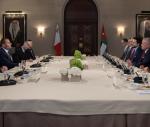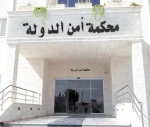You are here
Premier briefs IMF chief on refugee burden
May 11,2014 - Last updated at May 11,2014
AMMAN — Prime Minister Abdullah Ensour on Sunday received Christine Lagarde, managing director of the International Monetary Fund, and an accompanying delegation who are currently in the Kingdom to participate in a conference focusing on ways to generate jobs and achieve better growth.
The conference, titled “Building the Future: Jobs, Growth and Fairness in the Arab World”, is organised by the government, in cooperation with the Arab Fund for Economic and Social Development and the IMF.
At the meeting, that was also attended by Finance Minister Umayya Toukan and Central Bank of Jordan Governor Ziad Fariz, the premier highlighted the challenges facing the Jordanian economy, noting that the reforms that the country has adopted have helped put the Jordanian economy on the right track, the Jordan News Agency, Petra, said.
Ensour briefed Lagarde on the impact of the Syrian crisis on the economy, highlighting the increasing pressure on the country’s infrastructure and services, and Jordan’s need for support to overcome these challenges.
Lagarde, who visited the Zaatari Refugee Camp on Sunday, asserted the need for assisting the Kingdom to overcome the exacerbating repercussions of the Syrian crisis.
She was accompanied by the finance minister in her Zaatari visit.
Lagarde, who arrived in Amman Saturday evening to take part in a high level regional economic conference, commended Jordan’s role in hosting and assisting Syrian refugees and donated $15,000 for the hospital in the camp, according to Petra.
She described her visit to the camp as important to understand the mechanism of distributing humanitarian aid to refugees, Petra said.
Related Articles
The International Monetary Fund (IMF) will on Sunday open in Amman a two-day regional conference to discuss policies that can generate jobs and lead to better growth and equity in the region.
Over the past two days, Arab policy makers and International Monetary Fund (IMF) officials debated policies that can achieve macroeconomic stability in the region, job creation for the young, a better business climate and more transparency in both the public and private sectors.
Over 200 policy makers, representatives of the private sector and civil society, and academia from the Middle East and North Africa (MENA) will convene in Amman on May 11 to discuss challenges and opportunities of economic transformation in Arab countries in transition.

















